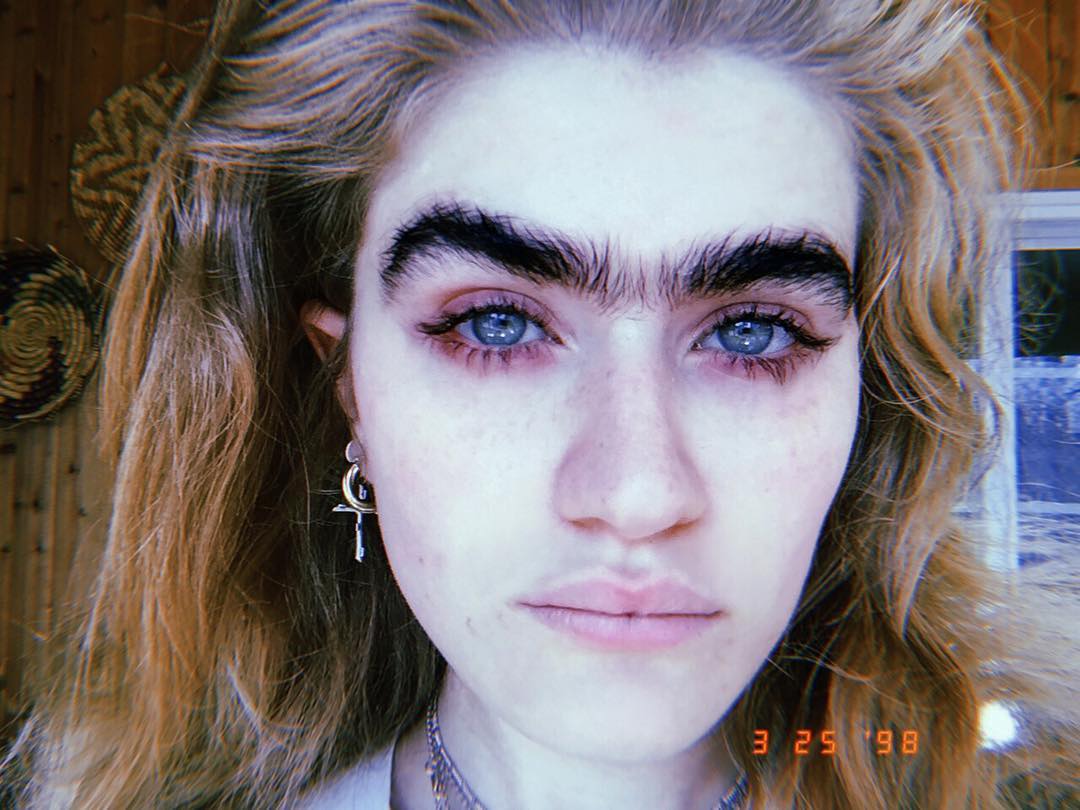21-year-old Sophia Hadjipanteli has one eyebrow instead of two. It’s big, it’s bold, it’s black and it’s bushy, and guess what, it runs across the entirety of her face. Left to right, right to left, it’s the same whichever way you look at it. She inherited it from her Greek Cypriot father, who also has impressive brows, and she embraced it in reaction to her mother’s warnings against the dangers of over zealous plucking.
A natural blonde, Sophia had originally dyed her brow black by mistake, something about leaving the dye on for too long, but then decided she actually quite liked it. So she kept it. She stopped tweezing, threading and waxing shortly after because, let’s face it, busting out the old tweezers and getting to work on that brow is painstaking and time consuming.
Anyway, big deal. Only, it is actually a big deal as it’s seemingly divided the internet. A quick scroll on her Instagram and you’ll see comment upon comment praising the model’s unique looks and empowering stance when it comes to embracing your weirdness and cultivating a sense of beauty outside of strict societal norms. But for every nice comment, there’s a horrid one basically telling her to go kill herself for having a few hairs growing out of her forehead. And yet, where some might buckle under the pressure of the world wide web’s anti-weirdness police, and find themselves reaching for those tweezers, Sophia remains defiant. So much so that she created the #UnibrowMovement, an online initiative dedicated to removing the stigma surrounding eyebrow hair and celebrating beauty in all its different forms. Here she shares her story.
“Some of my earliest memories are of being in front of a camera with my mum telling me where to look and how to pose. Modelling has always come naturally to me, even as a toddler. Fast-forward to when I was 15 and a photo my mum took of me was posted on the Italian Vogue website. That was the first public platform my face was ever shown on. Just a side note for the trolls saying my eyebrows made my career — I didn’t have dark eyebrows or a unibrow at that point in my career.
I suppose these days I’m more or less known for my unibrow. Growing up, my parents would never, ever place value on my appearance. When I’d get a good grade in school or praise from a teacher, they’d come and hug me and say, “We’re so proud of you, our beautiful girl.” So the way my parents used the word ‘beautiful’ was with regard to my actions, who I was as a person and the way I treated others.
However, as I got a bit older, each time a relative or friend would see me, they’d start off the conversation by commenting on how “beautiful” I was. It kind of bothered me, because I had been accomplishing so much in school and it felt like I was being reduced to way I looked.
Ever since I became conscious of that, I wanted to do as much as I could to challenge this and take control of how others perceived me. First, I started doing so with eccentric outfits, and then started rebelling a bit with my actions and the way I spoke to people. Then I stopped tweezing my eyebrows.
I was controlling the type of attention I was getting, and I still am, which feels really good. With everything you do, having a sense of control is crucial. But we are constantly changing, which is something we can’t control. The #unibrowmovement is a movement for this very reason, it’s always evolving. And it’s a hashtag because I think a lot of people hide things online, and I want the movement to inspire people to want to showcase things they may otherwise hide, both on and offline. I want everyone in this community to support each other through the hashtag.
I’m really quite proud of being able to make others feel more confident in their differences by embracing what makes me unique. I think it’s really awkward to have divided the entire internet over a few hairs between my eyebrows. I am very proud to be associated with thick eyebrows, unibrows, or expression through beauty.
My relationship with my body and self-image is definitely a work in progress. I’d be lying if I said that at one point I felt bad about myself and that now I feel better — it’s bullshit when people say that. Insecurities, unfortunately, are something that don’t tend to ever go away completely. Naturally as humans, we’re our own worst critics, especially when we want to be the best we can be. In a way, insecurities can be good because they can challenge our best. But they should never define who we are, and you should never base how much you like yourself on how much you dislike one part of you.
That said, regardless of what you do, you’ll get negative criticism, some on a lesser scale than others. But I definitely do like to respond to certain comments; not necessarily to defend myself, but because more people are counting on me to represent them and be their voice, so I have to show them that I am here for them. Also, when I respond to someone and challenge their opinion, sometimes I’m able to change their perspective and make them more understanding of what I, and others, stand for. And that makes me feel good, because all I really want to do is encourage understanding.
I’m literally just here to be myself, and if that helps other people, then that’s awesome.”

